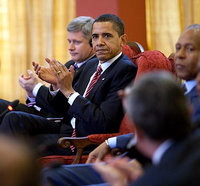Reports of the imminent death of U.S. hegemony in world affairs go at least as far back as the Nixon administration, and to date, they have all disappointed. While challengers have risen and fallen, none have managed to make themselves full-spectrum superpowers capable of both diplomatic leadership and global military reach, in combination with indisputable economic heft and soft-power appeal.
Now, with the "rise of the rest" -- concentrated in, but not limited to, the so-called BRIC package of Brazil, Russia, India and China -- we are presented with the argument of a collective challenge to American world leadership. Let me count down 10 good reasons why that notion will likewise prove disappointing.
10) Catch-up models don't equal global leadership: The "genius" that is the China model, for example, consists of export-driven growth "expertly" managed by a single-party state given to favoring national flagship companies -- not exactly an unblazed path in Asia. And what happened to Japan and South Korea once they scaled the heights of extensive growth? They naturally settled into slower-paced intensive growth as their populations aged, and made their way up the production chain by incrementally improving largely Western inventions -- hardly upsetting the global economy's innovation hierarchy. And while China's coastal region is making that transition nicely, let's not forget about those hundreds of millions of still-impoverished rural folk that have barely started their climb there, much like in India, Brazil, Indonesia and South Africa. The West may only see the train's engine, but these countries' national leaders will be preoccupied with their respective "cabooses" for the next couple of decades.

